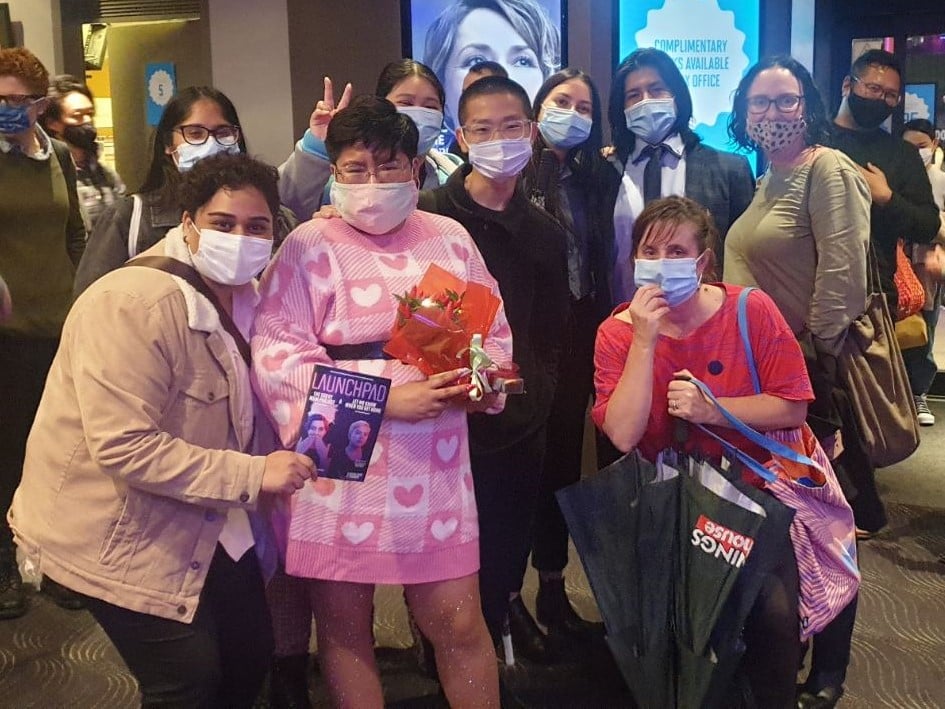




Written by: Miranda Aguilar
I would love for this play to have a second life. If you’re interested, please get in contact with me.
Developed with Support from:
I would love for this play to have a second life. If you’re interested, please get in contact with me.
Developed with Support from:
CuriousWorks, National Theatre of Parramatta, Australian plays Transform (APT) (formerly PWA), The Q at The Joan Theatre, and Blacktown Arts Centre.
The project’s presentation at National Theatre of Parramatta’s Riverside Theatre was supported by the Australia Council of the Arts, the Australian Government’s arts funding and advisory body.
All official presentation images were taken by Noni Carroll.
![]()
![]()
![]()
All official presentation images were taken by Noni Carroll.



Let Me Know When You Get Home
“Its miraculously happy ending might make the curmudgeons among us roll their eyes but I, for one, was cheering,” Harriet Cunningham, Sydney Morning Herald.
Let Me Know When You Get Home is my first full length-play. I’d been writing some version of it forever, though I officially started in 2016, as part of the CuriousWorks writer’s group (which I eventually facilitated). After years of play-writing, grant writing, mentorship, producing and all the delicious process that comes with theatre work - it hads its debut in Western Sydney at the Riverside Theatre of Parramatta March 18th - 20th, 2021, as part of National Theatre of Parramatta’s 2020/2021 season.

Let Me Know When You Get Home is about growing up queer in Western Sydney. It’s about suburban isolation, queer joy and friendship, and trying to find your place in the world.
I wrote this work because I spent so much of my teenage years feeling disconnected and isolated, and the process of making the work gave me so many beautiful friendships and connections. How do I even begin to talk about how much everyone who has helped me with this means to me?
How much it means to finally understand what it’s like to work with Filipinix kababayan like Valerie Berry and Gloria Demillo? How much it meant to me that Leila Enright found my play a year after it was meant to have been finished supported by APT (PWA at the time), and championed it for me? Or how invaluable Caitlin Newton-Broad’s mentorship through CuriousWorks kept me going as someone who at that point felt completely disconnected from the theatre world? And that doesn’t begin to cover all the friends, colleagues and mentors who read my work, worked on creative developments with me, gave me feedback, made the work REAL.

I found out I was non-binary through this work (after five years of writing a non-binary character). I learned I was a writer and a theatre-maker because of this work. I learned to advocate for me and my audiences and what I believe in because I believed in this work.
Thank you. Thank you. Thank you. I will never be grateful enough.
You can read more about the work and its development here.
You can read my Audacity to Expect What I Deserve essay here.
You can read more about the premiere and the audience engagement strategy I worked on for the work here.
I also spoke about the work and it’s processes for the ‘Media Arts Stories: Enabling Communities’ which can be read here.
This is what I wrote for the playwright’s note for its premiere:
Growing up queer, Filipinx and isolated, it never helped me to hear adults say that 'it gets better.' I didn’t want to wait until I escaped the suburbs and was able to move to Sydney, Melbourne, San Francisco or some other seemingly mythical queer utopia. I just wanted to feel less lonely.
I wrote Let Me Know When You Get Home as a coming-of-age story for young folks that understands how out-of-reach 'escaping' your racist, homophobic and transphobic community can be. I wanted a work that didn’t say, ‘it gets better,’ but instead tells young people, ‘I know it sucks right now, so I’m going to stay here with you.’
So, for every queer person who has been told they need to ‘escape’ Western Sydney: I wrote this for you, no matter whether you left, stayed, or came back. Everyone deserves to feel safe, loved and accepted. I hope this work feels like home to you.
